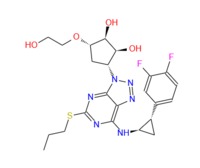TICAGRELOR
Specifications
TICAGRELOR
C23H28F2N6O4S
274693-27-5
Ticagrelor, a new platelet aggregation inhibitor successfully developed by AstraZeneca (U.S.), is the world’s first reversible combination orally-administered P2Y12 adenosine diphosphate receptor antagonist.
It is used to reduce cardiovascular death and heart attacks in patients with acute coronary syndrome (ACS.) Rapid onset after oral administration, and can effectively improve symptoms of patients with ACS. Thienopyridines is a reversible P2Y12 inhibitor, so it is particularly applicable towards patients who need to undergo anticoagulant therapy before surgery.
It is used to reduce cardiovascular death and heart attacks in patients with acute coronary syndrome (ACS.) Rapid onset after oral administration, and can effectively improve symptoms of patients with ACS. Thienopyridines is a reversible P2Y12 inhibitor, so it is particularly applicable towards patients who need to undergo anticoagulant therapy before surgery.
| Ticagrelor was approved by the U.S. Food and Drug Administration (FDA) on the basis of PLATO clinical studies. PLATO was a 43 country, 862 center randomized, double-blind, multi-centered study which included 18,624 patients hospitalized for ACS. Patients were randomly given either aspirin plus ticagrelor, or aspirin plus clopidogrel, two antiplatelet regimens. The study showed a 16% reduction in risk of heart attack, stroke, or death in the group taking Ticagrelor compared to those who took clopidogrel. The PLATO study demonstrated the benefits of Ticagrelor for patient survival, and is currently widely recommended as a treatment strategy for ACS. In addition, at the same time it reduces operative myocardial infarction and thrombosis after stent implantation, it also does not increase the overall risk of fatal bleeding and other serious adverse effects. Ticagrelor however has two shortcomings. First, it must be taken twice a day, compared to once a day for clopidogrel, and secondly, it may cause adverse effects such as breathing difficulties, significantly more than with the latter. Its half-life is only 12 hours, and taken twice a day, a challenge for patients with poor compliance. In practice, it has also been found that around 20% of patients treated with clopidogrel do not follow their prescriptions, and these patients are even less likely to take the prescribed doses when using ticagrelor. Thus, as a rapidly reversible drug, direct withdrawal will likely increase the risk of acute thrombosis, causing myocardial infection or stroke. |
- Country: China (Mainland)
- Business Type: Hangzhou Huisheng Biotech Pharmaceutical Co.,Ltd
- Market: The Middle East,Europea,Russia,and South America and US market
- Founded Year: 2002
- Contact: Tibi Teng








